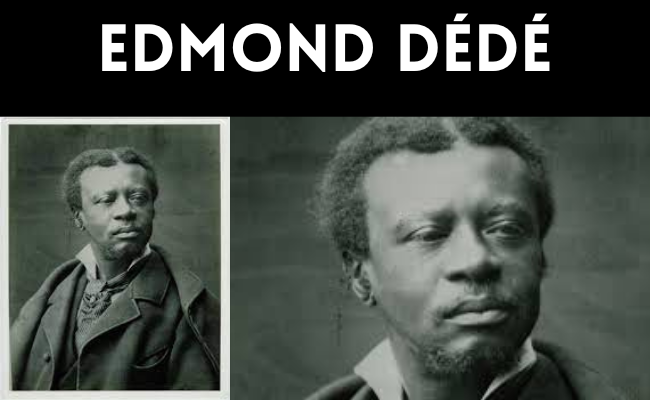Edmond Dédé | Early Life | Musical Training and Career

Edmond Dédé (1827-1907) was a French-Creole composer and violinist from New Orleans, Louisiana. He is considered one of the first professional composers of Afro-Creole descent in the United States. Dédé’s compositions reflect the influences of European classical music, African folk music, and Caribbean rhythms. He is best known for his opera La mulâtresse Erzulie, which premiered in 1884.
Dédé was born in New Orleans to a family of free people of color. His father, Jean Baptiste Dédé, was a carpenter and his mother, Marie Louise Girard, was a seamstress. Edmond Dédé began playing the violin at an early age and gave his first public performance at the age of eight. He went on to study music with various teachers in New Orleans, including Louis Moreau Gottschalk.
In 1847, Dédé joined the New Orleans Brass Band as first violinist. He toured with the band throughout the United States and Europe. Upon his return to New Orleans, he became leader of the quadroon balls, which were social gatherings for people of mixed European and African descent. He also worked as a music teacher and orchestra leader.
Dédé composed several works for piano, voice, and orchestra. His opera La mulâtresse Erzulie was inspired by a Haitian folktale and tells the story of a young woman who is possessed by the spirit of a voodoo queen. The opera was well received by audiences and critics alike.
Dédé’s legacy lies in his contributions to American music
Early Life
Edmond Dédé was born in New Orleans, Louisiana on October 28, 1827, the son of free people of color. His mother was a quadroon, and his father was a mulatto. Dédé’s parents were both from families of mixed African and European descent who had been in Louisiana for several generations.
Dédé’s early life was spent in the French Quarter of New Orleans, where he received his musical training. He began playing the violin at the age of six, and by the age of twelve, he was playing in dance halls and theatres. In 1843, he joined the New Orleans Brass Band as first violinist. He also played in orchestras and military bands.
In 1847, Dédé married Celestine Jourdan, with whom he would have eight children. The following year, he composed his first piece of music, “La Danse des Nègres”, which was published in New Orleans.
Musical Training and Career
Edmond Dédé’s musical training began at an early age, as he was exposed to a variety of music while growing up in Martinique. He started playing the violin at the age of six, and later studied music theory and composition. In 1854, he moved to Paris to study at the Conservatoire de Paris, where he studied under François Bazin and Fromental Halévy.
Dédé’s first professional gig came in 1858, when he was hired to play in the orchestra of the Théâtre Lyrique. He quickly rose through the ranks, becoming a soloist and eventually becoming the conductor of the orchestra. He also began composing his own music, and his first opera, Les Mulâtres, premiered in 1865.
During his career, Dédé composed a number of operas, ballets, and other works. His most famous opera is La Veuve Couderc (1874), which was very successful in France and was later performed in New York City. He also wrote several zarzuelas, which are a type of Spanish opera. In addition to his operatic works, Dédé composed several pieces of chamber music and orchestral works.
Dédé’s compositions were very popular during his lifetime, and he was highly respected by his peers. After his death in 1901, his music fell into obscurity, but there has been a recent revival of interest in his work.
Edmond Dédé’s Compositions
Edmond Dédé was a highly prolific composer, writing over 400 works during his lifetime. His compositions encompassed a wide range of genres, including operas, symphonies, concerti, chamber music, and songs. He also wrote several works for the stage, including ballets and incidental music for plays.
Dédé’s operas were particularly well-received, and he was considered to be one of the leading opera composers of his time. His most famous opera, Les Mulâtres (The Mulattoes), was first performed in 1869 and was praised for its originality and dramatic power. Other notable operas by Dédé include La Veuve (The Widow), La Fille de Roland (The Daughter of Roland), and Le Roi des Sables (The King of the Sands).
Dédé’s symphonies are also noteworthy; his Symphony in D minor, composed in 1857, is considered to be one of the finest examples of the genre from the 19th century. His other symphonies include the Symphony in G major (1858), the Symphony in C major (1859), and the Symphony in E minor (1861).
In addition to his orchestral works, Dédé also wrote a number of chamber music pieces, including several string quartets and a piano trio. His vocal music includes a large number of songs for voice and piano, many of which were inspired by his native Martinique.
Dédé’s compositions have been praised for their melodic beauty, technical mastery, and innovative harmonies. He was a highly influential figure in French music, and his work helped to
Legacy
Edmond Dédé’s legacy is one of immense talent, hard work, and innovation.
Dédé was an important figure in the development of Creole music and helped to popularize it both in Haiti and abroad. His compositions are characterized by their catchy melodies, interesting harmonies, and use of traditional Haitian instruments. He was also a skilled performer and was known for his high-energy live shows.
Dédé’s influence can still be heard in the music of Haiti today. Many modern Haitian musicians have been inspired by his work and continue to perform and record his songs. His music has also been featured in films, television shows, and commercials.
Dédé’s legacy continues to grow as his music continues to reach new audiences. He is considered one of the most important Haitian musicians of all time and his contributions to Creole music will be remembered for generations to come.
References
Edmond Dédé’s compositions have been recorded and released by numerous labels, including Smithsonian Folkways, Arhoolie Records, and Rounder Records. His music has also been featured in films, such as the documentary film, The Life and Times of an African Composer (2007).
Dédé’s music is currently taught at universities and colleges across the United States, including Yale University, the University of California at Berkeley, and Oberlin College. In addition, his music has been performed by symphony orchestras, such as the New York Philharmonic and the Boston Symphony Orchestra.
Conclusion
Edmond Dédé’s contributions to music are vast and significant. He was a highly skilled composer, arranger, and performer, and his work has had a lasting impact on Haitian music. His compositions are known for their beautiful melodies, complex harmonies, and innovative use of traditional Haitian instruments.
Dédé was also a pioneer in the use of Haitian Creole in musical composition, and his work helped to popularize the language among Haitians. Today, Edmond Dédé is considered one of the most important figures in Haitian music history, and his work continues to inspire musicians all over the world.



